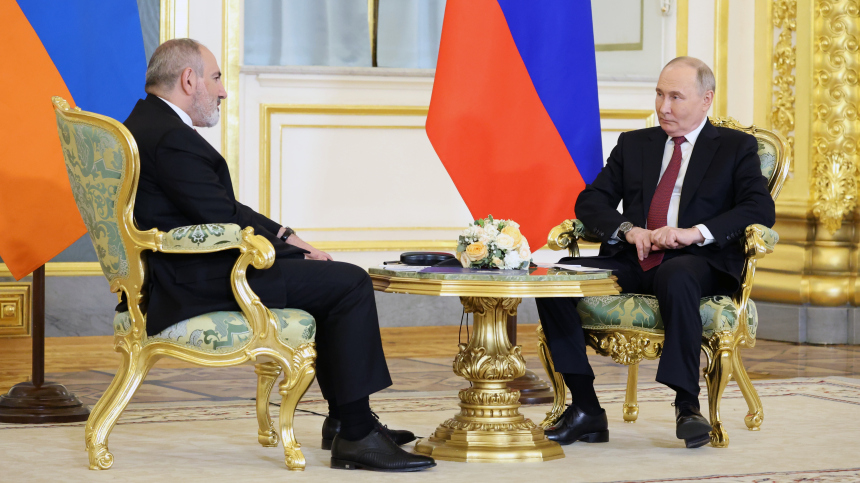Russia's Military Withdrawal Affects Regional Dynamics
The decision by Russia to withdraw its military personnel and border guards from certain regions in Armenia marks a significant shift in regional security and bilateral relations.
Published May 10, 2024 - 00:05am

Image recovered from 5-tv.ru
At a meeting on May 8th in Moscow, Russian President Vladimir Putin and Armenian Prime Minister Nikol Pashinyan agreed on the withdrawal of Russian military and border guards from several Armenian regions, as stated by Kremlin spokesperson Dmitry Peskov. This development reverses the deployment requested by Yerevan in the fall of 2020 due to changing conditions, emphasizing no further need for Russian presence in these areas.
However, Peskov highlighted that Russian border guards will remain on the Armenia-Turkey and Armenia-Iran borders to continue their duties. He also acknowledged that Armenia stopped financing for the Russian-led military alliance Collective Security Treaty Organization (CSTO) amid strains in ties. Nevertheless, Moscow retains a cautious optimism regarding the ongoing dialogue.
Concurrently, Putin has secured his fifth presidential term, winning a non-democratic election with 87% of the votes. The tenure extension till 2030 cements his domination over Russian politics, as significant opposition has been suppressed. Putin's grip on power was on display in his inauguration, devoid of key western representatives, amidst a conflicting reputation of preserving Soviet heritage and allegations of Nazi methods by Ukrainian President Volodymyr Zelensky.
On the international front, Putin advocates the Eurasian Economic Union (EAEU) as an effective instrument countering Western sanctions. Despite challenges in expanding the union, it strives for greater integration to counterbalance European influences. The ongoing conflict in Ukraine, highlighted by further attacks on its infrastructure, underscores differing narratives - Russia's war commemoration and Ukraine's accusation of modern-day Nazism.
In this context, Armenia's distancing from Moscow comes amid a lost war with Azerbaijan over Nagorno-Karabakh. Amidst regional maneuverings, these developments affect the security and political landscape of Eastern Europe, with repercussions for international relations.
The recalibration of military presence by Russia in certain Armenian regions signifies a noteworthy shift in the geopolitical dynamic within Eastern Europe. Prime Minister Nikol Pashinyan's request for the pullback may be interlinked with the political tumult in Armenia following the war over the Nagorno-Karabakh region. While Armenia has faced significant losses and political instability, it has also sought to reassess its alliances and international standing. The fall of 2020 was a time when Armenia heavily relied on Russia for security against the backdrop of its defeat against Azerbaijan; however, the changing regional security environment necessitates a different approach from Yerevan.
The retention of Russian forces at Armenia's borders with Turkey and Iran, however, continues to underscore both the strategic importance of Armenia in Russia's regional security calculus and Armenia's complex position in the broader geopolitical landscape. While Armenia appears to be disentangling from some facets of Russian influence, its positioning on the edge of the volatile South Caucasus means that it cannot wholly sever security ties with its powerful neighbor.
Domestically, Putin's sustained reign following the recent election outcome has been scrutinized by both domestic critics and international observers. Accusations of electoral malfeasance and a crackdown on opposition figures cast a shadow over the election's legitimacy. Putin's administration has been marked by an emphasis on stability and strong governance—a narrative that resonates with a segment of the Russian populace even as it alienates others who seek political reform and an opening of Russia's political landscape.
Putin's advocacy for the EAEU highlights Russia's strategic aim to construct an economic bloc capable of offsetting the influence of Western sanctions and asserting its economic sovereignty. However, the enlargement of the EAEU remains beset by issues such as economic disparities among member states and the geopolitical interests that sometimes diverge significantly from Moscow's vision. Nonetheless, Putin's government perceives it as a vehicle for economic and political cohesion that could potentially lay the groundwork for a multipolar world order less dominated by Western powers.
The unfolding humanitarian plight and infrastructural devastation in Ukraine shed light on the starkly polarized narratives circulating in the international realm. Whereas Russia, under Putin's leadership, recollects the Great Patriotic War as a potent element of national identity and triumph over Nazism, Ukraine, under President Zelensky, accuses the current Russian state of emulating the very tactics of historical foes. The conflict not only strains the fabric of international diplomacy but also impacts the domestic contexts of the nations involved, influencing national discourse and the orientation of foreign policy.
Armenia's strategic pivot is not occurring in isolation. It reflects a broader trend of post-Soviet states reassessing their political, economic, and security orientations in a rapidly evolving geopolitical milieu. As Eastern Europe becomes an ever more contested space, the implications of Armenia's decision to recalibrate its military cooperation with Russia could extend well beyond its immediate region. The global community, closely analyzing these shifts, continues to adapt its policies and alignments in response to the fluid interplay of power, influence, and alliance within the international system.







